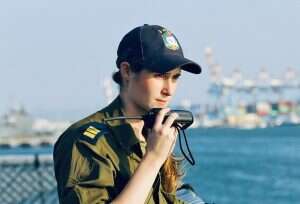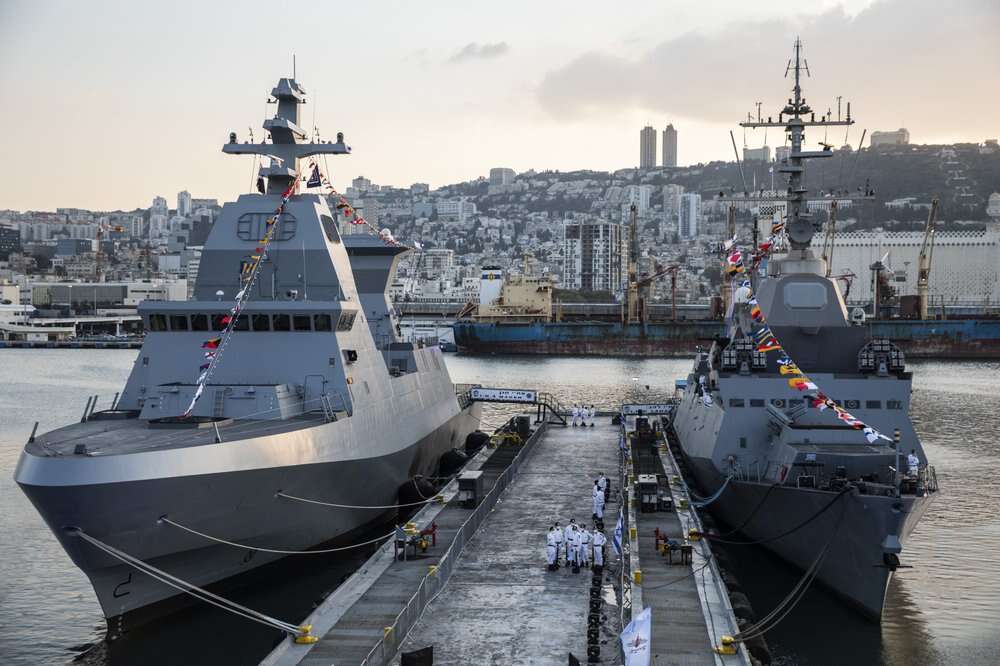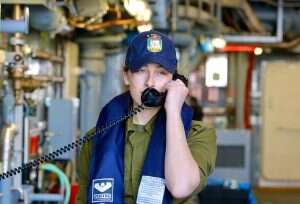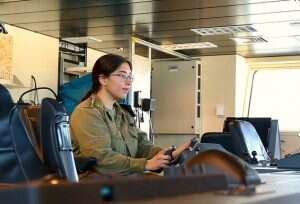There is a naval superstition that women can't operate machinery on combat vessels. Veteran captains will explain that because "machine" in Hebrew is feminine, it might become "jealous" of women sailors and refuse to cooperate. For years, until a few months ago, women were barred from working as machinists on combat ships.
Sgt. Jessica Klempert, 22, the first female machinist to serve on an Israeli Navy missile ship, is responsible for monitoring the ship's machines and operating its generators and motors. She is currently the only woman in Israel to hold this job, and was one of the four sailors entrusted to bring Israel's new Sa'ar 6-class corvette warship, the INS Magen, to the country from Germany.
Follow Israel Hayom on Facebook and Twitter
Klempert, who wears a pendant shaped like an anchor, was born in Israel to parents who immigrated from Ukraine. She studied electrical engineering at the Naval Officers School of Acre. Her father was the chief machinist on a Dabur-class patrol boat.
"I was raised on the sea, on the Navy, on ships. In 11th grade, our entire class sailed a yacht to Cyprus, and every student did every job on deck. When I chose to study in a machinist track, my father asked why I needed it. He suggested I study electronics. But I realized that I was going to smash the stigma," Klempert tells Israel Hayom.

The INS Magen ("Shield") is one of four new ships ordered by the Israeli Navy. The other three are due to be delivered over the next two years. The Magen is currently docked in Haifa, without the advanced electronics systems with which it will be outfitted over the next few months. It took nearly two weeks to sail it the 7,500 kilometers (4,660 miles) to Israel from the shipyard in Germany where it was built.
Standing on the bridge, one can see Israel's other Sa'ar boats, models 4.5 and 5.
"See how powerful this boat is compared to the others," says Sgt. Einav Eshuel, 20, a navigation technician. "All of a sudden, they look small."
Eshuel grew up in an observant home on Moshav Sde Yitzhak. Her parents, who both served in the Israeli Air Force, were surprised when their daughter opted for the navy.
"The mystery surrounding ships always attracted me," she says. "I'd see the hunk of steel without knowing what went on inside, and that moved me. I knew that there were a lot of men on missile ships, and I said to myself, this would be a test for me. I could see if I'd be able to leave my comfort zone, which was comprised only of girls, and get used to [serving in] a mixed force. I thought we'd be a group of girls, but now I can say that my best friends are the boys who serve with me. I quickly got used to having guys around all the time."
"The adrenaline on a missile ship is crazy," says Klempert. "You always feel like you're part of something secret. You're doing something that no one knows you did, which is kind of a shame, but still – it's a good feeling. My dad was in the navy for years, and even now, even after I enlisted, he hasn't told me everything he did there."
Israel Hayom meets these sailors, along with communications specialist and medic Sgt. Irina Polianker, 20, from Maaleh Efraim, and Capt. Shira Klieger, 23, an electronics and defense officer on the INS Magen.
Klieger points to the Haifa neighborhood of Bat Galim. "That's where I live," she says. Klieger was born and raised in the city's French Carmel neighborhood, and now she rents an apartment with roommates in the seaside enclave. Sometimes, when the ship is docked, she goes home for an evening and comes back the next morning. She has served on all the Israeli Navy's Sa'ar 5 ships: the Eilat, the Hanit, and the Lahav. Now her job is to make the Magen operational.
Klieger leads us into the belly of the ship, down 10 narrow stairs. The heart of the ship is the "machine," to which feminine characteristics are attributed. This is where its main motor and generators are located. "Don't be fooled. The vibrations of the floor aren't from the waves," Klieger warns.

Klemfort smiled: "So far, the machine has been my friend. We haven't fought yet."
The ship is controlled from the adjacent control room. Beyond that is the combat intelligence center, which is where Klieger will control the ships' defenses. On the voyage from Germany, due to a lack of manpower, she was stationed on the bridge.
"Aside from the fact that I walk around with a drill and a laptop, my goal is to determine when there is a threat to the ship, and deploy the proper response so that threat doesn't hit the ship or any asset we are defending, like a natural gas drilling rig," Klieger explains.
The living quarters are on the lower decks. Each boasts three triple bunk beds, three closets, and a drawer for each sailor. Generally, the newest sailors sleep on a mattress on the floor for a few weeks, but Klempert, Eshuel, and Polianker got a room for women. Each chose a middle bunk – because no one steps on it to get up, but they're not too high. They will keep their bunks when additional female soldiers arrive – and 20 out of the 80 personnel who will be serving on the ship are expected to be women. Unlike her three female shipmates, Klieger shares a room with two male officers. When space is short, male and female officers are allowed to room together. The shared room boasts two standard bunk beds and has a private toilet and shower.
In 2000, Ora Peled became the first woman to complete the Israeli Navy's officers training course. She served on a Sa'ar 4.5 ship. In the November 2018 recruitment, nearly two decades later, the navy allowed women to train to serve on missile ships. They serve two years and eight months, and some sign on for an additional time.
The female sailors who enlisted two years ago were trained to serve on the INS Magen as part of a long-term strategy. The new ship was planned from the beginning to accommodate both male and female sailors, unlike the previous models of missile ships, which were retrofitted to include bunks for women. On the older missile whips, sailors' shower time was limited to 20 seconds to save clean water. The INS Magen carries more water and has a better filtration system, as well as a heating system that provides constant hot water.

"The only difference between us and the guys is the separate quarters, bathroom, and shower," says Eshuel. "Nothing other than that. We're all friends, even kind of a family. You don't feel a difference. We were with the same crew on the Sa'ar 5, so we all got used to each other."
Klempert: "On the Sa'ar 5 they really had to get used to the presence of girls. There were a few who arrived before us, and separate quarters and bathrooms had to be provided for them. The guys also had to adjust themselves to the presence of girls. There were a few who took a minute or two to realize that they couldn't walk around in a towel after getting out of the shower. After everyone gets used to it, you can find lifelong friends here. I see my friends from the ship as family. You grow with them, breathe with them, do everything with them, more than on other bases."
When Klieger began serving as an officer on the INS Hanit ("Spear") at the end of 2017, she realized she would have to share a room with two men. "I had a moment of embarrassment. What do we do now? How do we dress? Do I have to go to the bathroom far away and get dressed there? But I came in with confidence, and together we decided on rules about how to handle it. When I wanted to get dressed, they'd leave, and I'd lock the door and dress. When they wanted to get dressed, I'd leave. On the INS Magen, we have an adjacent bathroom and shower, it's a different world."
Polianker: "Anyone who hasn't lived on board might think there's always sexual tension between the guys and the girls. But everyone here knows the limits, and what each one of us [women's] limits are, and what will make her uncomfortable if they go beyond that. I don't think there was any moment on a missile ship when I felt uncomfortable."
Klempert: "The guys here know that I can work just like any of them can, and there's no reason for me not to be one of them. No one would come up to me and say, 'You're upset because you have your period,' or anything like that."

Klieger: "I'd like to see a guy say something like that. I believe that each one of us has a strong enough personality to say, if necessary, that someone has gone too far. Happily, that hasn't happened. It's possible that in the first couple of days guys will say, 'Hey, there's a woman in command,' but after two days, when I prove myself professionally, it won't matter."
Q: There was a recent report that an NCO in the Israeli Navy is accused of taking pictures of female sailors in the shower. Did it ever occur to you that something like that could happen on board the ship?
Klieger: "It has occurred to me. When I get dressed in a shared room, I lock the door and don't leave it open so no one will come in without knocking. But we're all aware, and the environment on board is different. When we say that we're all family, it doesn't mean I want to see my brother walking around in his underwear. When it comes to that, we are very careful about privacy."
None of the four is currently in a relationship. Klieger last had a serious boyfriend when she was in officers' training, and they later broke up. Klempert dated a combat soldier before she was in the military, but since she enlisted, she hasn't been romantically involved.
Q: Is it possible that men avoid dating you because of your jobs?
Klempert: "There have been guys who started to flirt with me, and when they heard I was in combat and spent a lot of time at sea and on a ship, said it wouldn't work for them. As if it were obvious that a man can be a combat soldier and go home to his girlfriend only every so often, but when it's a female combat soldier, it's different. Right now I don't feel emotionally available for a relationship, because I prefer to concentrate on my job."
Sailors assigned to the INS Magen spent the last six months in Germany to prepare the ship to sail to Israel. They stayed at a hotel and were required to adhere to strict security protocol, such as wearing civilian clothes and staying in small groups, and avoiding loud conversations in Hebrew. They also had to change their travel routes frequently. Only on deck did they wear black utility trousers and long-sleeved blue shirts. They were flown to Israel for visits in April and in August.
On Oct. 29 the Israeli flag was raised on the deck, and command of the ship was officially handed over to the Israeli Navy. Since then, the four female sailors have barely set foot on dry land. They have learned every part of the ship, down to every screw, and practiced sailing it.
"We studied a lot of theoretical material in Germany, but you can only put it together once you're on board," says Klempert.
Klieger: "To completely know the ship, you need to live on it and sail on it. You need to know what's good and what's bad about it, experience it thoroughly."
Polianker: "On a voyage, we're together 24 hours a day. You live and work on board, and the only quiet time you have is when you draw a curtain [in the bunk]. Everything happens on the ship, and everyone finds her own quiet place."
Klieger: "On other ships, there wasn't even a curtain, so this is an improvement … With nine people in a room, you don't really have space for time to yourself. So either you get into bed and draw the curtain, or you talk to one of your friends on board."

The sail from Germany wasn't easy. "The sea was rough," Polianker says. "I handed out anti-nausea medication to everyone, and I took it, too. Other than a few guys who could handle the sea better, everyone was throwing up. There was even someone who lost a lot of fluids and had to get an IV."
Klempert raises her hand: "That was me. So embarrassing. I don't know how I vomited so much on such a big ship, which is supposed to be stable. After the IV I recovered, got up, and went to my shift. They didn't have to substitute anyone."
Eshuel stresses that this doesn't happen on every voyage. "Throughout my entire service, I've thrown up maybe twice."
Klieger: "There's no one who doesn't throw up at sea … If a person is born with a tendency to get nauseous, like me, will feel it even on an ordinary day at sea. I throw up on car trips, too. There are vomit bags on board, you step aside, everyone plugs their ears, and that's it. You tie up the bag, throw it in the trash, rinse out your mouth, and go on. The first time I was seasick, the crew comforted me and told me it happens to everyone … The goal is to be able to throw up and keep on going. When there are enough people on board, we try to let a person rest, so it won't be a trauma. But after a few voyages, people need to get used to not feeling drained after they throw up."
There were also exciting moments. "You're sitting on the bridge, everyone's serious, gazing at screens, and suddenly someone points and shouts, 'Dolphin! Dolphin!' We also saw whales, sea turtles, and strange fish that I have no idea what they're called," Klempert says.
All four women have been on operations outside of Israel's territorial waters. "You recite the traveler's prayer before you sail, and know that you're doing something super important. It's an amazing feeling. Crazy adrenaline," says Eshuel.
Klieger: "Enemy missiles can reach Israel's shores, too, but when you're at sea, especially when you're outside Israeli waters, the entire crew is on alert. There's more tension. Then you get back after a crazy mission, and you can't tell anyone … not even sailors on other ships. At least you know you took part in something bigger than you are."
They admit that every voyage entails fear of the unknown. "The first time I sailed as an officer, a year ago, I was really frightened," says Klieger. "While the entire defense of the ship didn't depend on me, if we don't complete an important mission like intercepting a missile, the responsibility lies with me. It's stressful.
"I was always telling myself, it wasn't my first time at sea, that I had an experienced crew, everything would be all right. The more time passes, you gain more and more confidence. One of the big advantages of serving on a ship is that it's a group game, not a solo game, like a plane. There's always more oversight, and more people who can help," Klieger adds.
Eshuel: "The first few times I was on board the INS Lahav ("Blade"), the last ship I served on, I imagined the Dakar submarine. The thought that I serve on a missile ship that is exposed to threats and not always defended put me off. I was anxious. How could I know that if a missile were fired at us, all the systems would work, and how could I be sure I wasn't heading out on a suicide mission? I talked to my commanding officer about it. He sat with me and took me through all the defense systems until I understood the basics and the reasoning behind all sorts of things we do on the ship that are designed to protect us. It also calmed me down, because I know what happens at every stage of the mission.
Q: Do you still have stressful thoughts?
"Yes. Before we left Germany, I asked the commanders if we would be accompanied or on our own, because the ship wasn't armed. They explained that we had ships with us … but I truly stopped being afraid only when I saw the Israeli Navy ships join us in the last few kilometers before we arrived."
En route from Germany, they missed their families keenly. Use of cellular phones is not allowed at sea, so sailors are cut off from the world. Eshuel says she was impatient to talk to her mother and tell her how excited she was about the new ship, and Klempert, who was promoted at sea, in accordance with missile ship tradition, had to wait days to tell her parents.
The Israeli Navy collected video footage of the sailors' families and would show it as a surprise from time to time during the voyage.
"The guys tried to stay cool, but we burst out in tears. Even the sailors who have kids cried when they heard their children," Klieger says.
Irina: "I cried when I saw other people's videos, it was really moving."
While at sea, news updates are collected for the sailors – five minutes of news and a few sports scores.
Subscribe to Israel Hayom's daily newsletter and never miss our top stories!
Klieger: "There's a rule that they don't announce terrible things that happened in your city so we don't find out in the middle of a voyage that something happened so someone close to you. In any case, there's nothing we can do about it from the middle of the ocean. There's actually something good about that detachment. It gives you a few days when you're only with the people who serve with you, and you leave your routine and enter a kind of calm. Because the sea is simply beautiful, and you see the sunrise, the sunset, and stars, and the moon, and a lot of nature that's hard to notice when you're stressed by work."
After a few days of leave to recover from the long trip from Germany, the women returned to the ship. They stowed their gear, put on utilities, and started to work. The ship is due to be outfitted with radar, a cannon, 16 anti-ship missiles, a system to defend the ship from missiles and aircraft, and more. A full 90% of these systems are Israeli-made, which means that the work is slated to continue for another year and a half – long after Eshuel and Polianker are due to be discharged.
Eshuel: "There's something very exciting about the fact that this is the first ship of its kind, and we are trying out the systems and the structure. I really want to stay and see how it looks at the end, but I'm not sure I'll sign on for extra service just for that … we'll cross that bridge when we come to it."
Klieger: "Even I don't think I'll be privileged to see the ship operational. My 'money-time' is now, because my job is to oversee all the installments of the defense systems and make sure that everything is as it should be. I'd be happy to have the privilege of serving on it once it's operational."




